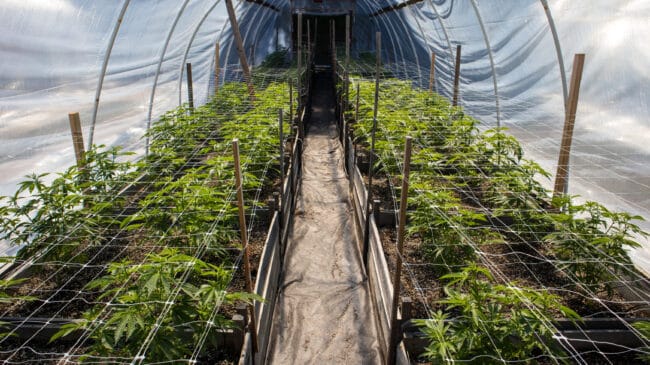“[O]ur industry is collapsing and our global leadership and legacy is at the brink of disappearing forever.”
This statement was penned by a coalition of California cannabis advocates and commercial licensees in an open letter to Gov. Gavin Newsom and legislative leadership in December. The letter outlines a number of major problems with the way the state has chosen to tax and regulate the legal cannabis market and makes suggestions for improvement.
To be sure, the primary complaints raised by the group are nothing new and largely reflect criticisms from the Reason Foundation and elsewhere. They boil down to two major issues:
- The magnitude and complexity of California’s cannabis tax structure creates a price differential between legal marijuana markets and California’s long-established, black market supply chains; and
- An effective ban against legal marijuana retailers throughout large geographic regions leaves black-market suppliers as the only realistic provider in many parts of the state.
As the coalition states, “The opportunity to create a robust legal market has been squandered as a result of excessive taxation.” In California, cannabis licensees face cultivation taxes and retail excise taxes at the state level, in addition to all other taxes to which businesses are subject generally. At the local level, they often face additional taxes based on canopy square footage, distribution, and supplemental retail excise taxes. Between this myriad of taxes, licensing fees, and regulations that make production more time and labor intensive, the final price of marijuana products can be two to three times higher in the legal market than in the illicit market.
A substantial price disparity between legal and illicit markets for what is essentially the same product will induce both producers and consumers to remain in the illicit market. Real-world data confirms this. The California Legislative Analyst’s Office (LAO) reported in February 2021 that the number of licensed marijuana businesses in the state actually fell from around 16,000 in 2018 to around 10,000 in 2020. Reports indicate that at least some of this reduction is explained by legal businesses making the choice to revert to the black market. On the consumer side, research compiled by the Reason Foundation shows that legal-market consumers are even more price-sensitive than those on the illicit market. Taken together, this means that California’s tax-induced price disparities are choking off the legal market at a time when it was expected to grow.
The LAO recognized this in 2019 and recommended a dramatic simplification of the tax structure. It suggested lawmakers eliminate all wholesale taxes and consolidate the state’s tax effort into a single retail excise tax. It also recommended slashing the overall tax rate to “somewhere in the range of 15 to 20 percent” in order to undercut the illicit market. Gov. Newsom agreed with at least a portion of LAO’s recommendations in his 2020 budget proposal.
A separate problem is that large swaths of California’s population have no access to a legal marijuana seller within a reasonable distance of their homes. There are fewer than 1,000 licensed marijuana retailers in California. For comparison, there are nearly 14,000 liquor stores. That’s because more than two-thirds of local governments in the state have banned legal marijuana sales within their jurisdictions while others have made licensing extraordinarily difficult. The result is that California boasts only 2.1 legal marijuana shops per 100,000 residents, according to Politico. Even Nevada, which has become notorious for its arbitrary caps on the number of licenses available, has more legal stores per capita than California.
Where legal suppliers have been excluded, black-market competitors have swooped in to fill the void, often brazenly operating completely illegal brick-and-mortar establishments. In fact, Marijuana Business Daily estimated there were nearly 3,000 unlicensed dispensaries operating in California in 2020. In Los Angeles, illegal dispensaries outnumber legal dispensaries 10-to-1.
The coalition now complaining to Gov. Newsom and legislative leadership has requested the elimination of state cultivation taxes (as LAO has recommended), expansion of retail access, and a three-year break from retail excise taxes so the legal industry can catch up with the black market. Because California’s legal market was established by initiative, these changes would require the approval of a two-thirds majority of the legislature. But policymakers have not exactly embraced these reforms. Powerful special interests including public employee unions have actively opposed any reduction in cannabis tax rates, hoping to make more money available to expand public employee rolls and thereby enhance dues collections. SEIU lobbyist Robert Harris recently mocked reform advocates while speaking to Politico, saying, “I’ve never heard of an industry that didn’t say, ‘Reduce our taxes, we’ll sell more and you’ll make more.’”
For their part, some California licensees are now threatening to withhold cannabis taxes in defiance of state law until the legislature enacts changes. While this would effectively place California cannabis companies on equal footing with their black-market competitors, it would also threaten the legal status of these entities.
California is known around the world for the quality of its cannabis. However, everyone from LAO to industry participants agrees the state’s legal marketplace suffers from major problems. If California fails to address those problems, it could cede its standing within the cannabis industry forever. As the coalition said:
“It is critical to recognize that an unwillingness to effectively legislate, implement, and oversee a functional regulated cannabis industry has brought us to our knees. The California cannabis system is a nation-wide mockery; a public policy lesson in what not to do.”

